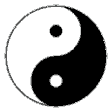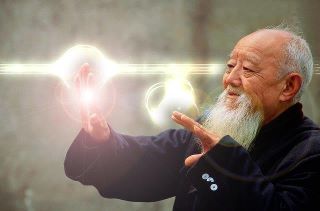“I’ve finally settled on Buddhism,” she said,
“but it’s more than just a fashion statement;
I’ve always done some of my best work in my bathrobe.”
BRIAN ANDREAS, STORYPEOPLE
Yin Yang
TaiChi (or Taijíquán) is an ancient, soothing Chinese martial art that, when practiced regularly, not only teaches self-defense tactics, but also improves one’s internal health, peace of mind, relaxation and self-awareness. It is done from a standing position which increases focus, balance and strength as well.
Many forms of the TaiChi martial art exist. This can be a bit confusing as some of these forms might be of the same name, but depending on your Master or teacher, include different interpretations of the movements involved. However, no matter which one you select to practice, they all consist of a series of slow-moving natural postures that are deliberate, centered, grounded and meditative. The practice enhances development of the body's internal vital energy (chi), which leads to improved cardiovascular flow, digestive assimilation, lower blood pressure and stress levels, as well as stimulating the workings of one’s immune system.
The forms can fit the abilities of every body type, and therefore can be practiced as a gentle meditation or a strengthening exercise. If there are issues with a certain movement in a form, the movement can be adjusted to accommodate that.
I don’t understand how it works, but it does; and if you spend too much time trying to analyze ‘the how of the why’ it works, it won’t work for you. That is the ‘non-think-thinking’ way of TaiChi! ~ JILLY PHILLIPS
Feel the Energies!
Guang Ping Yang Taijíquán
19 Basic Principles
- Whole body relaxed; do not use force.
- Keep the mind concentrated; do not let it wander or become confused.
- Be peaceful and natural; do not be tense.
- You must hold the head up straight and feel as though a string is attached to the crown of your head and you are being suspended by it.
- The body must be straight; do not lean in any direction.
- There must be a clear distinction between empty (non-weighted) and full (weighted) feet (alternation of Yin and Yang).
- Both hands must move together; do not let one stop.
- Breathing must be even, regular and natural; do not hold or constrict the breath.
- In even the slightest movement, the whole body must move; do not let any part stop separately.
- Let the dantian lead the body.
- Movements must be in squares and circles; the limbs must not be too bent (flat) or too straight (stiff).
- Movement must be smooth and regular; do not suddenly speed up or slow down.
- In Stillness the mind must be active: with Inactivity the mind must be still.
- The body’s center of gravity is in one of the three places: a) On the left foot; b) On the right foot, or c) In the middle.
- The whole body must be in harmony (there are 6 harmonies): 3 Outer Harmonies - a) Hand with foot; b) Elbow with knee; c) Shoulder with hip. AND 3 Inner Harmonies - a) Thought with Intent; b) Intent with Breath; c) Breath with Strength.
- Why is it important in practice of Taijiquan to be careful in the fullness (shi) and/or emptiness (xu) of the feet? Because emptiness permits nimbleness (lightness of movement, agility); nimbleness permits change in one’s own position; change in one’s own position permits transformation of the opponent’s movement; transformation of the opponent’s movement permits attack.
- In the changes and transformation of Taijiquan, rest and motion have not beginnings, change the transformation have not ends, emptiness and fullness alternate naturally.
- The method of using Taijiquan is to seek straightness in the winding, gather it, then thrust it out; in the changes and transformation if the enemy does not move, I do not move. If the enemy moves a little bit, I have moved first.
- Concerning the use of hands and feet in Taijiquan – in extending do not extend all the way; be relaxed but do not be limp; the strength may be broken but the intent (yi) remains solid.
Why is TaiChi So Slow?
NATURE DOES NOT HURRY,
YET EVERYTHING IS ACCOMPLISHED.
- LAO TZU
Physical Benefits
The slow, flowing movements in TaiChi help to eliminate qi blockages, balance the system, promote healthy qi flow and facilitate a meditative state. When movements flow evenly, qi flows freely. When done slowly, qi flows with the movements and energizes the whole body.
Basic Principles
When you slow down, you can more accurately tune into what’s going on with yourself and others. You can more nimbly adjust to the needs of the present moment. Slow, peaceful movements help calm the mind. They help you to tune out the enormous number of distractions bombarding you daily in modern life. Without the ability to filter the noise, it’s very difficult to get in touch with your Inner Presence. On the other hand, when your mind is calm, you can listen for subtle information. But slowing down isn’t just good for getting in touch with your Inner Voice. What’s going on in your mind has a profound impact on what’s happening with your body. The AMA reports that slow motion movement enhances the immune system.
It’s now widely accepted that stress is the major factor in 90% of ailments. When you calm your mind, you reduce stress. Reduced stress enhances the immune system and that is the most sophisticated resource you have to combat sickness. Slowing down is not unrelated to single pointed attention. It’s also connected with the objective of present moment awareness and developing a practice of being quiet and not needing to constantly be involved doing, making, creating, or distracting yourself from the moment in any other way.
As for questioning the fact that TaiChi is considered a Martial Art so the movements should be fast and furious: 1) It is made up of many of the martial arts self-defense movements; and 2) Surprise attacks are the most effective and least lethal (if you want them to be)!
TaiChi Breathing
We are all "works in progress," and some of the most worthwhile things we decide to do for ourselves remain just that. It is a very human thing to expect to be experts at the things we study regularly, whether in our work or play, but to be experts in the truest sense of the concept of those things that we choose to master, can sometimes be an illusion. We should never stop growing and learning, so the really good stuff tends to be an ongoing process, and I am not alone when I say that TaiChi is mine.
With TaiChi, one movement feeds off of the other, so I try not to think when I begin my daily practice of it that "today, I will do this move or that move, perfectly," I want to, but there always seems to be a tweak here and there that I feel is needed, so I kind of defeat myself by thinking if one is off the others are as well. I have only been practicing TaiChi for 3+ years, BUT I have learned from both of the teachers I've had that eventually you make it yours with the movements you end up adjusting for yourself AFTER you get the hang of it (sort of), and if it feels good to you, then you are just about there. In other words, if it feels good don't think about it that much and just do it! One of the most difficult things for me to get right in all of this is something we do everyday and should be good at - BREATHING!
When I went to the Zen Mountain Monastery in Mt. Tremper NY to learn Meditation, someone said to me, "you mean you went somewhere to learn to 'think? " Well, yes, I guess I did, but I learned that meditation isn't "thinking," it is "non-think thinking.” I learned that what you must do is concentrate on yourself, and cultivate your own sense of self-awareness, not some deep thought-concept like E=MC2! And the way you learn to do it is to quiet your mind by concentrating on your breathing...now why didn't I think of that? I'm was relieved that it didn't involve the thinking stuff because I have so many thoughts running around in my brain most of the time, that I never could decide what to think about, so my meditation efforts were sabotaged from the beginning until I spent some time with people who know what it's all about! It all started because I needed to calm my inner self, and believe me, breathing is what it's all about.
MEDITATION, IT ISN’T WHAT YOU THINK!
- LUCY BARTIMOLE
But gosh, it isn't enough to get my feet and hand movements coordinated so I am moving properly a la TaiChi; I have to breath in tune to those movements. Most of the time, I find I am holding my breath, but when I do it all correctly, move AND breathe on cue, it is pure heaven!
GREAT BUDDHIST QUOTE
LET US RISE UP AND BE THANKFUL;
FOR IF WE DIDN’T LEARN A LOT TODAY,
AT LEAST WE LEARNED A LITTLE;
AND IF WE DIDN’T LEARN A LITTLE,
AT LEAST WE DIDN’T GET SICK;
AND IF WE GOT SICK,
AT LEAST WE DIDN’T DIE. SO,
LET US ALL BE THANKFUL.




